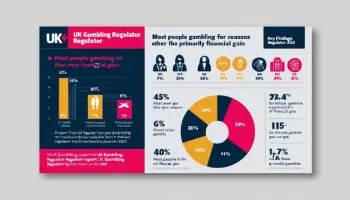A UK gambling regulator report claims that most people are not primarily motivated by money to gamble

Expert in writing blogs and news articles about the iGaming Industry

The UK's Gambling Commission recently published a report disclosing the several factors that drive people toward gambling activities. According to research, the desire to win large amounts of money remains important; however, other factors, including entertainment value and excitement, become equally significant or even more important elements for most gamblers.
Various Gambling Motivations
The Gambling Commission surveyed 9,742 adult participants through the Gambling Survey for Great Britain (GSGB) between July 2023 and February 2024. The survey inquired about the primary reasons for their gambling behavior in the previous year. The findings were enlightening:
A majority (86%) of respondents admitted that the possibility of winning large amounts served as a key reason to gamble. On the other hand, the enjoyment of gambling served as the primary reason for gambling, according to 70% of the respondents. 58% of participants stated making passive money was their main reason for gambling, while another 55% found gambling exciting. Additionally, 24% claimed that they gambled to socialize. The desire to compete against others appeared as a factor responsible for 9% of gambling incidences. Finally, a small number (8%) claimed to gamble to impress others.
This study confirms that since personal and social experiences greatly influence the casino experience, financial enticement is not the only factor accounting for gambling behavior.
Gambling Motivations for Different Age Groups
The research pointed out significant distinctions that emerged between different age groups. The main motivating factor for people aged 18 to 24 to gamble was fun, with 83% reporting that they found it amusing. The primary motivation for substantial financial gain appeared more frequently within the older age groups. The data shows that people change their gambling patterns as they become older and take on additional responsibilities, which influences their motivation to visit gambling websites.
The Link Between Gambling Motivation and Gambling Frequency
Most people who reported gambling within the previous four weeks had different reasons for doing so. Out of all identified motivations to gamble, winning huge sums stood as the number one reason at 39%. The need to earn a passive income motivated over 20% of the participants to gamble, while 15% reported gambling frequently primarily for enjoyment.
These results imply that, especially among regular gamblers, other elements like fun and excitement are also crucial even if the possibility of financial gain is a major determinant. According to the research, problem gambling tended to occur among those who gambled for financial gain instead of those who sought gambling for entertainment purposes.
Gambling Motivations Across Different Online Casino Games
Analysis of particular gambling behaviors showed that different types of motivation exist among gamblers. Participants of online casino games primarily sought excitement and stimulation for enhancement purposes. On the other hand, participants identified online sports betting as a popular means to escape the stresses of daily life responsibilities. Meanwhile, people who bet in retail sports venues primarily chose to participate for the skill involved and the testing nature of the activity. Lastly, it was identified that people who preferred to play at online casinos preferred escape through games, whereas guests at physical casinos participated for social reasons.
These realizations highlight the intricate interaction among the elements influencing people to engage in different kinds of gambling. Online gambling platforms provided high convenience along with easy access, and these advantages attracted younger gambling customers, yet traditional land-based gambling outlets continued to draw older demographics.
Psychological and Behavioral Considerations
Expert researchers have engaged in prolonged debates regarding how psychology affects gambling behaviors. Research findings confirm that gambling functions beyond economic purposes since it serves psychological and emotional requirements. The combination of the dopamine reward from nearly winning, the social aspects of gambling, and gamble-risk stimuli creates a comprehensive gambling experience.
Behavioral scientists state that knowledge of psychological components will help create responsible gambling frameworks. Problem gambling reduction programs need to focus on emotional and social factors since financial risk reduction alone will not be sufficient for addressing the issue in the long term.
According to the Gambling Commission, “A better understanding of motivation in gambling activities remains essential for studying gambling behavior patterns together with their derived outcomes. This research on gambling gives regulators and policymakers the information they need to make focused rules that protect vulnerable groups while still allowing people to gamble for fun.”
A Premise for Future Research
The results of this research offer important findings, yet numerous aspects remain unexamined about how gambling motivation works. Future studies might look at how changes in technology, culture, and economy affect gambling practices over time. The results of these investigations might lead gambling operators to adjust their marketing strategies along with their systems for responsible gaming management.
For example, the promotion of responsible gambling in gaming platforms becomes more successful when their focus is on social enjoyment and non-monetary goals. Similarly, campaigns meant for younger gamblers could concentrate more on enhancing the recreational value of gaming than on financial rewards.
Conclusion
According to the findings of a recent study by the UK Gambling Commission, many individuals participate in gambling activities due to non-financial incentives, even though the primary attraction is the potential for large winnings. The combination of the thrill of playing with real stakes and social bonding serves as primary factors. The survey plays a crucial role in constructing appropriate policies along with support systems that promote responsible gambling.
For those of you who are interested in more of what is going on read this article about NCLGS Proposed Model iGaming Act.
